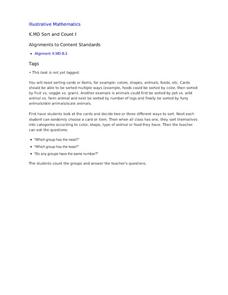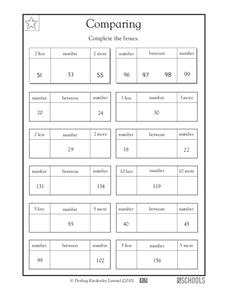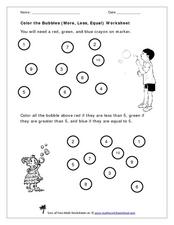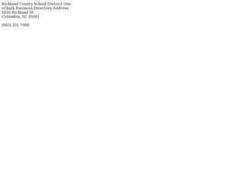Illustrative Mathematics
Sort and Count
Young mathematicians are on their feet and moving around in this primary grade sorting activity. After giving each child an object or picture card, they then sort themselves into groups, counting to see which has the most or least...
Curated OER
And 2 More Makes...
If we add two more, how many does it make? Before youngsters start with addition, give them this clearly worded exercise to help them grasp the concept. Kindergartners focus on the term more as they examine four sets of flowers, draw two...
Curated OER
And 4 More Makes...
How many will there be if we add four more? Scholars examine sets of sports balls, drawing four more and totaling them. Sums in these four problems don't exceed 10, and the numbers 0-10 are written below for learners to reference as they...
Curated OER
Morning Math
Get your morning mathematicians thinking with this set of warm-ups. You can do them all in one day, or separate them and have kids do one each day. They will review past concepts and sharpen newer ones with this assortment of problems...
Curated OER
Comparing
Examine short number sequences to help scholars explore value comparisons. They look at various given numbers (both two-digit and three-digit) and write in values that are less or more by specific one-digit numbers (i.e. three less, two...
Curated OER
10 More or 10 Less
Practice adding and subtracting 10 with this outer space worksheet. On the top, scholars match digits floating in stars with sums inside a spaceship. Next, they do the same with subtracting 10, connecting numbers to differences. These...
Curated OER
Color the Bubbles (More, Less, Equal)
Combine coloring and number comparisons with your youngsters. They use color coding to identify numbers that are less than, greater than, or equal to five. The 20 numbers are enclosed in bubbles, making this more of a fun activity. Note...
Curated OER
Time to Draw More or Less Worksheet
Using familiar shapes, learners practice the math concepts more, less, and equal. They examine five circles, drawing two more in an adjacent box. Note: This one should be explained, as learners may not understand they are to draw seven...
Curated OER
Weight and Length Measurement Guided Lesson
This only has three problems, so consider simply projecting it and doing it with the whole class. First, they examine two baseball bats and circle the shorter one. Then, they consider which of two containers will hold more. Finally,...
Curated OER
More or Less...
As they look at 10 groups of shapes, learners compare the A and B columns in this "more or less" worksheet. Each set includes anywhere from zero to nine shapes, and scholars complete a simple comparative sentence by circling either less...
Curated OER
Amanda Bean's Amazing Dream
Use the book Amanda Bean's Amazing Dream to inspire your learners to solve and create multiplication word problems. After listening to the story, they solve two "which is more" problems. They explain their thinking with images, words, or...
Curated OER
Step Into My Shoes
Students order their classmates from smallest to largest foot length. In this ordering their classmates from smallest to largest foot length lesson, students trace each of their classmates foot. Students read a story called, 'How Big...
Curated OER
Number Chart and Number Line
First graders research strategies for identifying numbers through 100. In this number recognition lesson, 1st graders make games, create puzzles,and fill in missing numbers to practice number identification.
Curated OER
Which Holds More or Less Worksheet
While a nice visual approach to the math terms more and less, this comparison instructional activity doesn't have the best graphics. In the first part, scholars compare four pairs of related containers and circle the one that holds more....
Curated OER
Compare Sets of Objects Guided Lesson
Practice math vocabulary terms fewer, more, and data using this visual-object-analysis guide. Learners observe three sets of objects and answer three questions, two of which compare numbers of objects, and the last which asks scholars to...
Curated OER
Quiz: Using Er and More
For this "er" and more worksheet, students look at pictures and write sentences to compare 2 items, using adjective in a box and "er than" or "more than." May be used as practice or quiz.
Curated OER
Counting More Shapes
In this counting instructional activity, students count the number of shapes and draw a group of the same shape that is more than the first group. Students solve 2 problems.
Curated OER
More Worksheet
In this more worksheet, students count the number of shapes and draw a group of the same shape that is more than the first group. Students solve 2 problems.
Curated OER
Basic Word Problems
In this basic word problems worksheet, 6th graders solve 5 different types of word problems based on information described in each problem. First, they determine the number of books needed to read. Then, students determine the total...
Curated OER
Pounds
In this mathematics worksheet, 1st graders identify which items pictured weighs more or less than a pound. Then they circle the objects that weigh more and place an X on the object that weigh less than a pound.
Curated OER
Same, More, Fewer
In this mathematics worksheet, 1st graders color each circle red and draw one blue circle for each red one. Then they circle more, fewer, or same to identify which circles are which, red and blue.
Curated OER
More, Less or Equal
In this math worksheet, students compare sets and determine how they compare. Students count the size of small sets using the numbers 0 to 20 and identify if the sets are equal in size, larger or smaller.
Curated OER
Johnny Appleseed
Students meet and delve into the life of the American Folk Hero, Johnny Appleseed through the activities of the eight lessons of this unit. Math and language activities offering whole and small group encounters.
Curated OER
Fruit Pieces
In this fruit pieces worksheet, learners complete how many pieces of fruit are shown in 2 questions. First, they count how many fruits are there and circle the correct number. Then, students determine which group shown has more and which...

























